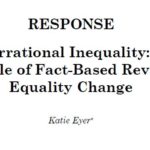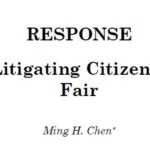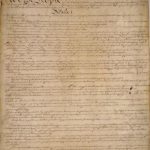Responses Category
Irrational Inequality: The Role of Fact-Based Review in Equality Change
May. 27, 2020—Katie Eyer | 73 Vand. L. Rev. En Banc 177 (2020) | In Broken Records: Reconceptualizing Rational Basis Review to Address “Alternative Facts” in the Legislative Process, Joseph Landau offers an important exposition of how legislative records “predicated on a false factual foundation” are, and ought to be, treated by constitutional equality law. As Landau...
Making Litigating Citizenship More Fair
May. 14, 2020—Ming H. Chen | 73 Vand. L. Rev. En Banc 133 (2020) | In Litigating Citizenship, Cassandra Burke Robertson and Irina D. Manta chart the contours of expanding immigration enforcement in the Trump administration: from criminal aliens and illegal aliens, to legal immigrants, to naturalized citizens. In their own words, their interest is “How do...
Neighborhood Names: Why Should the Law Care?
Aug. 27, 2019—Nadav Shoked | 72 Vand. L. Rev. En Banc 267 | Names matter. We all realize that they matter for our lives, but we do not intuitively assume that names matter for the law just as well. And yet, in many legal fields, they clearly do. In international law, the question what country gets to...
Corporate Incapacitation: A Handmaid’s Tale?
Aug. 27, 2019—Mihailis E. Diamantis | 72 Vand. L. Rev. En Banc 251 | In Incapacitating Criminal Corporations, W. Robert Thomas argues that corporate criminal law should think more creatively about incapacitation. As a general rule, I could not agree more with his motivating sentiment: inflexible dominant paradigms have stifled thought about how to sanction corporations for...
What to do about Chevron—Nothing
Apr. 29, 2019—Nicholas R. Bednar | 72 Vand. L. Rev. En Banc 151 | For thirty-five years, doctrinalists have tormented themselves trying to dissect the Supreme Court’s most infamous administrative-law doctrine: Chevron deference. We have asked when and how it applies. At the same time, we have asked whether Chevron should exist at all. In other words, does Chevron have any...
Towards Optimal Enforcement
Apr. 2, 2019—Kent Barnett | 72 Vand. L. Rev. En Banc 127 | Enforcing federal law seems simple enough. Federal agencies, which exist for exactly this purpose, enforce by identifying violations of a particular federal statutory scheme and accompanying regulations. But complications quickly arise. How should agencies enforce—by initiating judicial proceedings, by enacting rules or guidance to...
Personal Jurisdiction: The Walls Blocking an Appeal to Rationality
Feb. 6, 2019—Richard D. Freer | 72 Vand. L. Rev. En Banc 99 | Personal jurisdiction is a gateway to the judicial system. Without it, a plaintiff cannot vindicate her claims and the community cannot benefit from private enforcement of the law. In 2011, the Supreme Court returned to personal jurisdiction after a twenty-one year hiatus. Over...
Chevron on Stilts: A Response to Jonathan Siegel
Oct. 15, 2018—Chevron-on-Stilts-A-Response-to-Jonathan-Siegel AUTHOR: Philip Hamburger
Legal Jurisdiction and the Deterritorialization of Data
Feb. 2, 2018—Legal Jurisdiction and the Deterritorialization of Data Response to Jennifer Daskal, Borders and Bits, 71 Vand. L. Rev. 179 (2018). AUTHOR Paul Schiff Berman Walter S. Cox Professor of Law, The George Washington University Law School.
Commodified Promises and Contract Theory
Jan. 26, 2018—Commodified Promises and Contract Response to Erik Encarnacion, Contract as Commodified Promise, 71 Vand. L. Rev. 61 (2018). AUTHOR Brian H. Bix Frederick W. Thomas Professor of Law and Philosophy, University of Minnesota.
Neutral Principles and Political Power: A Response to Reverse Political Process Theory
Nov. 5, 2017—Neutral-Principles-and-Political-Power1 Response to Aaron Tang, Reverse Political Process Theory, 70 Vand. L. Rev. 1427 (2017). AUTHOR Matthew A. Seligman Climenko Fellow and Lecturer on Law, Harvard Law School.
Lost in Transplantation: The Supreme Court’s Post-Prudence Jurisprudence
Oct. 18, 2017—Lost in Transplantation The Supreme Court’s Post-Prudence Jurisprudence Response to Fred Smith, Undemocratic Restraint, 70 Vand. L. Rev. 845 (2017). AUTHOR Adam N. Steinman University Research Professor of Law, University of Alabama School of Law.
Institutional Effects on Reciprocal Legitimation in the Federal Courts
May. 23, 2017—Institutional Effects on Reciprocal Legitimation in the Federal Courts Response to Neil S. Siegel, Reciprocal Legitimation in the Federal Courts System, 70 Vand. L. Rev. 1183 (2017). AUTHOR Donald P. Klekamp Professor of Law, University of Cincinnati College of Law
A Mild Defense of Our New Machine Overlords
May. 23, 2017—A Mild Defense of Our New Machine Overlords Response to Kiel Brennan-Marquez, “Plausible Cause”: Explanatory Standards in the Age of Powerful Machines, 70 Vand. L. Rev. 1249 (2017). AUTHOR Visiting Fellow, Yale Information Society Project; Visiting Researcher, Georgetown University Law Center. J.D. 2011, University of Michigan.
Short-Circuiting the New Major Questions Doctrine
Apr. 25, 2017—Short-Circuiting the New Major Questions Doctrine Response to Michael Coenen & Seth Davis, Minor Courts, Major Questions, 70 Vand. L. Rev. 777 (2017). ABSTRACT In Minor Courts, Major Questions, Michael Coenen and Seth Davis advance perhaps the most provocative proposal to date to address the new major questions doctrine articulated in King v. Burwell. They...
The Township, The Hope of Democracy?: History As Moral Act
Apr. 6, 2017—The Township, The Hope of Democracy?: History As Moral Act Response to Daniel Farbman, Reconstructing Local Government, 70 Vand. L. Rev. 413 (2017). AUTHOR Samuel I. Golieb Fellow, New York University School of Law. JD, Harvard Law School. Ph.D. Candidate in History, Princeton University.















